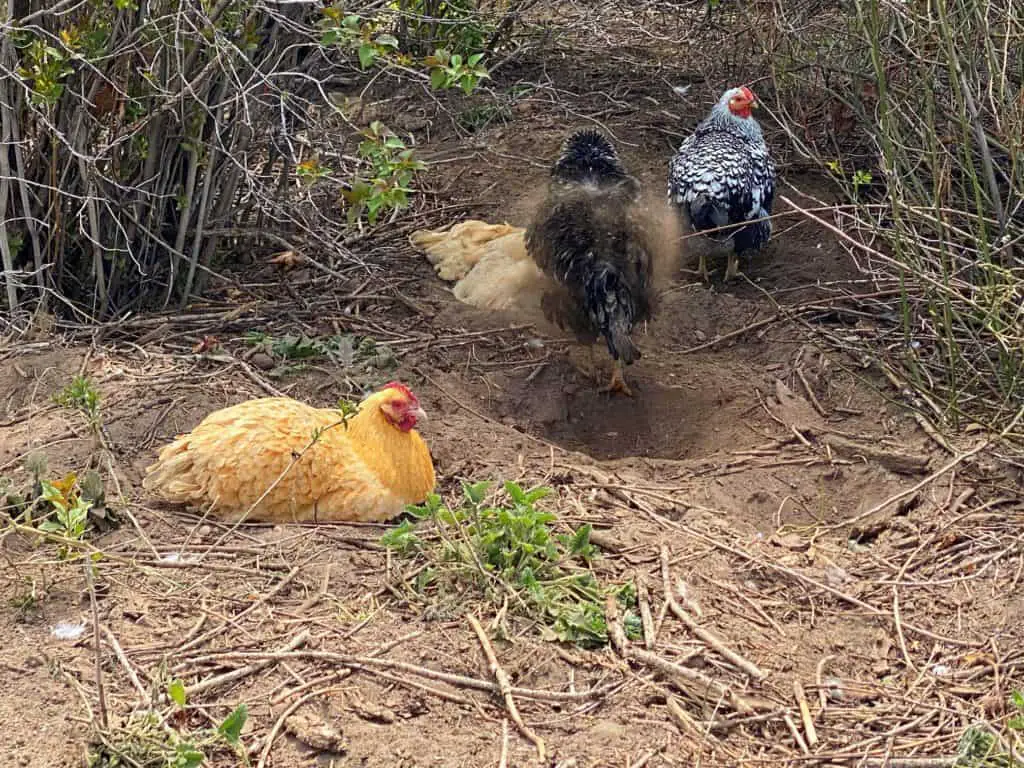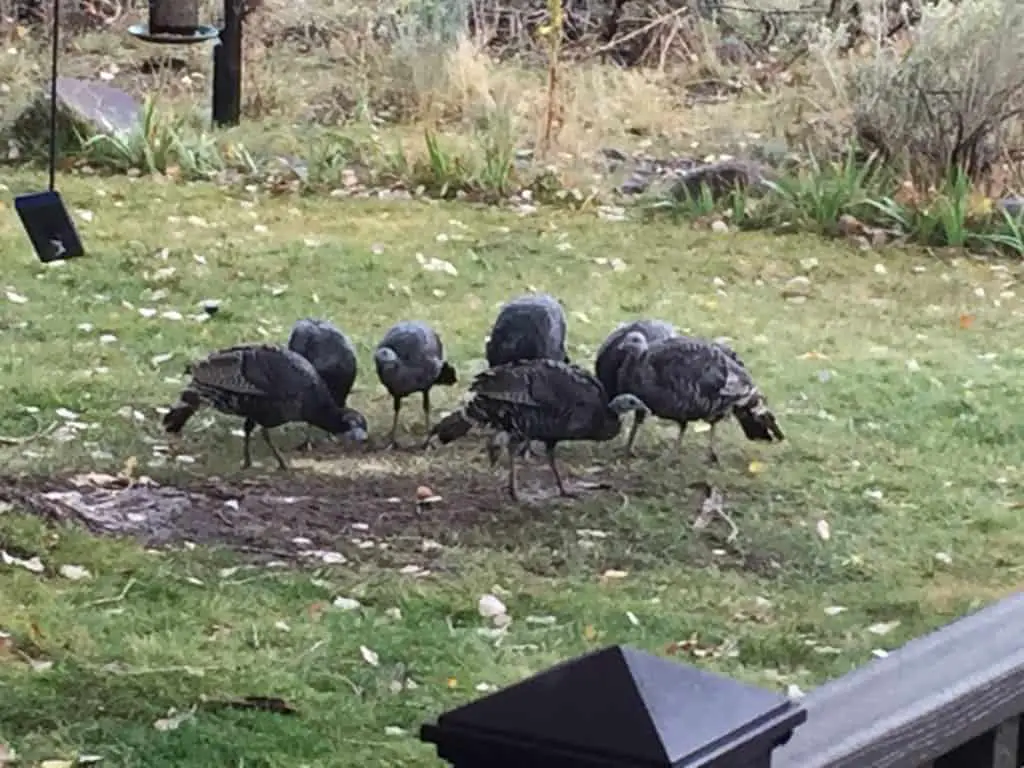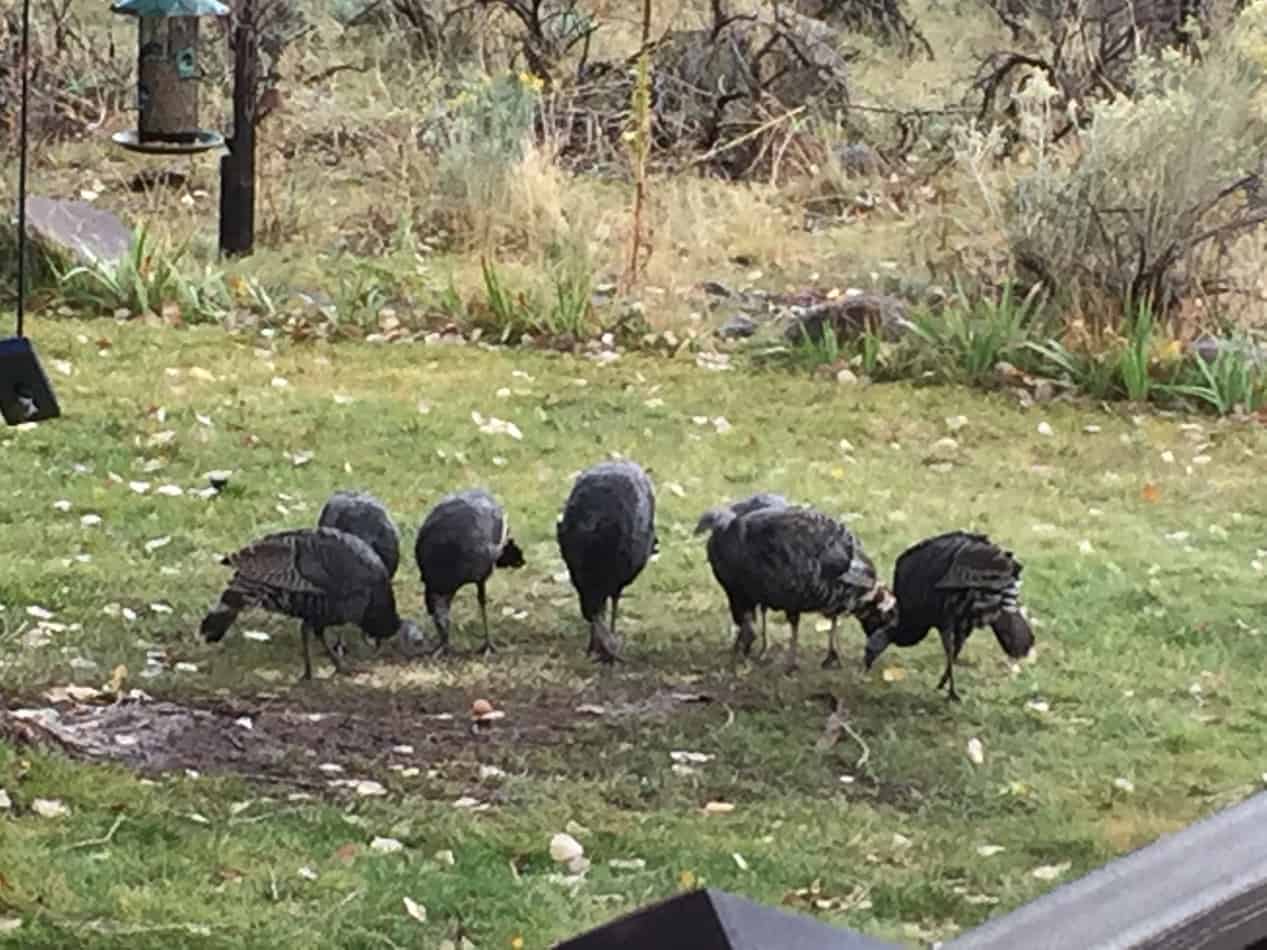Raising chickens is a great thing to add to your backyard, farm, homestead, and life. After raising chickens for a while, you may want to add variety to your flock. Adding turkeys could be something that you are considering.
Can you raise turkeys and chickens together? The quick simple answer is yes, and that this has been done for years. You do need to take some precautions, turkeys need a lot of room and there is a very serious disease called “Black Head” that you need to consider.
Hatch and Brood turkeys and chickens separately
Chicken chicks and turkey chicks are similar in appearance with a size difference. Turkey chicks are sizably larger than chicken chicks. With the size difference you would think that the turkey chicks would beat up on the chicken chicks. This is usually the exact opposite.
Turkey chicks are somewhat lethargic, timid, and docile. When put in with chicken chicks turkey chicks will often get picked on and may even get killed. Chicken chicks are vigorous, inquisitive, and can be fairly aggressive.
When hatching out your turkey chicks and chicken chicks you will want to separate them very soon after they hatch. You may even want to use two separate incubators to keep the newly hatched turkey chicks safe. It’s amazing to see how quickly chicken chicks hatch and are full of energy and ready to go.
Some people have had success with raising chicken and turkey chicks together from hatching them together. It is a bit of a risk and you need to keep close attention to the chicks. Separate them immediately if you see them picking at each other. Chickens can kill a docile turkey chick quickly.
A good practice is to order chicks already hatched from hatcheries or buy from a local farm and ranch store. I personally recommend this for first time and new poultry raisers. The hatcheries and farm/ranch stores take the risk of the initial hatching of chickens and turkeys not working out. The mortality of an incubator can be high for people that are new to doing it.
Once you get the chicks be it from your own incubator or purchased already hatched you should brood them separately. Keeping the chicken chicks separate from the turkey chicks will allow the turkey chicks to develop without being picked on and possibly killed.
Brooder set ups can be easily situated to keep the chicks separated and healthy. As the turkey chicks grow you may want to introduce them to your chickens when they are becoming larger and more vigorous.
Feed may need to be different
Another thing to consider is the protein content of the food for the chicks. Turkeys are a much larger bird and may need a high protein feed as they grow. Feed suppliers have come up with some options that can fit the need of a multi-species flock. Here is one all flock feed available online. Here is another option for feed.
Raising for meat, egg layers, feathers, or pets
Turkeys can be raised for multiple reasons. Turkeys are raised for meat, feathers, eggs, or pets.
Meat
If you are raising them to be harvested, you may want to separate them and give them a higher protein feed. This will allow the bird to reach the highest weight you can when butcher time comes.
Egg layer
If you are raising turkeys for eggs they will do fairly well on the same feed as your chickens, or the all flock feeds available.
Turkeys will need a ground nest to lay eggs in. Turkeys and chickens generally will not have a conflict with laying eggs in the same coop if you have ground level boxes for the turkeys and nest boxes for the chickens off of the floor. The flock raising feeds will do well for them.
For feathers
The feathers from the turkeys can have uses. Turkey feathers are used for art, crafts, and decoration. I use turkey feathers for tying fly’s for fishing.
You don’t necessarily need to kill the turkey for the feathers. Often I get plenty of feathers for my need just gathering the feathers that the turkeys loose just living life normally.
Pets
When raising chickens and turkeys together they can easily become pets. The fun and interesting personalities of the turkeys are very engaging. One tom turkey we had was just a joy to have around. He would keep watch on everything and warned the chickens about predators such as hawks or dogs.
Having a turkey as a pet is not that unusual especially with some specialty breeds. They can be rather beautiful and full of character.
Equipment
The equipment for raising turkeys is similar to chickens. The thing to consider again is the size of the turkeys. Some of the feeders and waterers are too small for turkeys to use effectively. You will want to consider some larger feeders and waterers to accommodate the turkeys.
Here are some feeders and waterers that could make it a lot easier for your turkeys.
Bigger perches
You will find out that turkeys will try to perch on the same things that chickens do. Some chicken perches just won’t work for turkeys. The perches for turkeys don’t need to be very elaborate or anything, just sturdier. 2×2 or 2×4 boards are a good option to make perches from.
Temperament
The temperament of turkeys is a little different than chickens. As stated earlier, turkey chicks are a lot more docile than chicken chicks.
When turkeys reach maturity, they will act different than chickens as well. They can act as sentinels and protectors. Turkeys will have very fun and interesting personalities as well. We had one tom that would fly up to the roof of the house and scan the fields keeping watch. When he would see a hawk or a stray dog, he would sound his alarm and flare out his tail and warn the rest of the flock.
Turkeys are generally not very aggressive with the chickens. However, they will protect the hens vigorously. If a rooster gets a little too rough with the hens, he may find himself on the discipline end of a turkey’s wrath. Some people have even found the turkeys will kill a rooster if the rooster is too aggressive.
Often the turkeys will become the mediators of the flock. Turkeys will break up squabbles and sometimes will look after shy or loner birds. When you see the personalities emerge from the flock is becomes really interesting and fun to see. For me it makes it difficult to harvest a turkey after you see how fun some of their personalities are.

Turkeys with Chickens Need Lots of Room
When introducing multi specie flocks together you will need to make sure there is enough room. Turkeys are huge compared to chickens. Turkeys will need a lot of room to live. Putting the two species together will require the space issue to be resolved.
When you do not have enough room for the chickens and turkeys several problems can arise. Crowded birds will not lay eggs as productively. More food will often get wasted trying to show acts of aggression or dominance without proper room. Death and cannibalism can be the result of too tight quarters for the birds.
Make sure to have plenty of room for turkeys and chickens. They will adapt to become a cohesive flock generally the chickens will be the first for food and treats and the turkeys will come later in a calmer method once the frenzy is over.
Blackhead disease
Blackhead disease is something to keep your eyes out for. Turkeys are susceptible to this terrible disease that will kill them and can infect the entire flock. Chickens are a bit more tolerant of the disease but can be carriers and can infect turkeys.
Blackhead disease comes from a protozoan that is a pericyte. This pericyte will attack important internal organs especially in turkeys. It attacks the liver and the intestine, specifically the cecum, of the host bird.
The protozoan is found in the eggs and larva of a parasitic worm, the cecal worm. Earth worms will eat the eggs and larva and the protozoan will infect the turkeys when they eat the earth worm. The protozoan can be in the soil and viable for up to 3 years, so it is difficult to eradicate once you have it.
Chickens are less likely to be affected much, but they can be carriers. Turkeys, quail, and game birds are all susceptible to the protozoan and can get very sick and die.
There is a treatment for the infection of Blackhead disease. You can use an antiprotozoal medication and treat your flock. Antiprotozoal medication needs to be prescribed by a veterinarian. Once prescribed you can great your birds and they should be ok. There are even some turkey feeds that have a Blackhead preventative.
Signs to look for with Blackhead disease is the turkeys acting lethargic, ragged feathers, not preening themselves, seeming depressed or just not feeling good.
If you do need to treat your turkeys with an antiprotozoal you should not eat the eggs they lay. You will also need to take precautions and separate the birds from your laying chickens.
If you don’t have Blackhead disease, then there is no worry and the chickens and turkeys will do great. If your property has been without chickens for a number of years you probably don’t need to worry that much about Blackhead disease.
Marek’s disease imunity
Mareks disease can be found in chickens and can prove to be deadly. When you keep turkeys and chickens together turkeys carry a disease that is similar to Mareks disease but is harmless.
When the chickens associate with the turkeys, the chickens build up an immunity to Mareks disease. The chickens will catch a related harmless virus and it gives the chickens a fair chance.
Introduction of turkeys to your flock
When turkeys are introduced to a chicken flock you will need to be careful. You should wait until the turkeys grow to maturity. Young turkey poults are docile and could be picked on by the chickens. A grown turkey should be able to hold their own with the flock.
Slow introductions would work well. Establishing a pen for the chickens and turkeys to see each other for a few days would be ideal. We have fashioned a transition pen within the coop to assist in introducing a new birds to the flock.
Some people have found successful introductions to the flock by using a good broody hen. A good dedicated broody hen can take excellent care of the turkeys. That will allow a smooth transition for the turkeys into the flock.
I have yet to find a broody chicken hen that would last the entire duration of raising their own chicks, so be cautious to use a broody hen that you know very well to be a good brooder.

Summary
In summary you can raise turkeys with chickens just fine and many have been doing this successfully for years and even generations. You will just need to be careful with a few things:
- Keep the chicken chicks and the turkey chicks separate. Turkeys are much more docile than chicken chicks.
- Make sure you have the correct feed that will work for both chickens and turkeys.
- The equipment such as feeders, waterers, and roosts will need to be bigger to accommodate the size of turkeys.
- Make sure there is plenty of room for the turkeys and chickens to roam, lay, and roost.
- Keep your eyes open for Blackhead disease and contact your veterinarian to treat it and save your birds.
- Take caution and precautions to introduce your turkeys to the chickens. Chickens are much more aggressive than turkeys.
If you follow these guidelines and suggestions, you can have a really fun and colorful flock to enjoy. Turkeys and chickens together really accentuate the different personalities of the birds. You will also have more opportunities of having turkey eggs, meat, or as pets.

